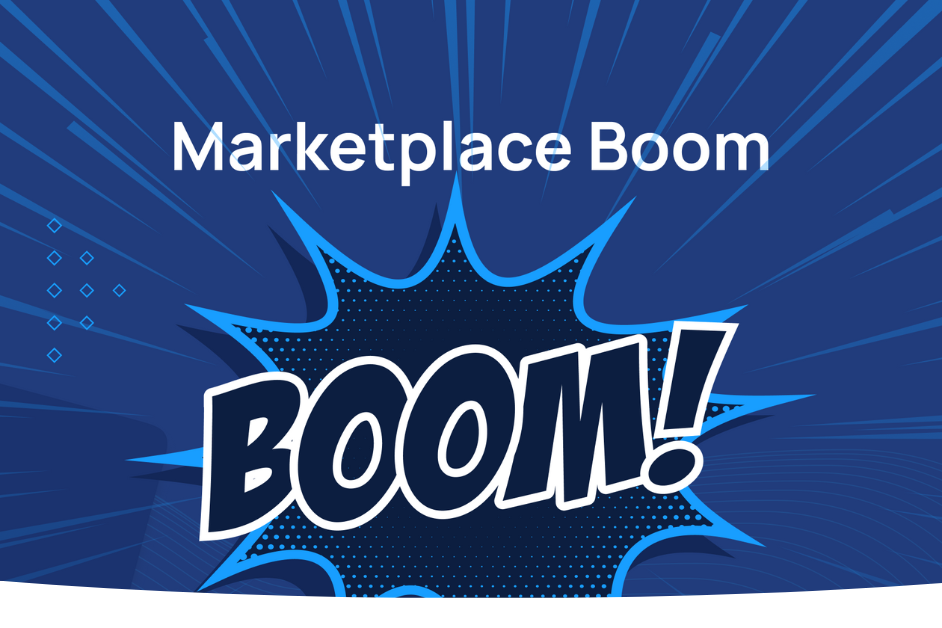The number of online marketplaces continues to grow, and this trend is certain to persist in 2025. The rise of the ecommerce marketplace as a dominant business model has transformed the way businesses operate online. Platforms that have so far operated exclusively in selected markets, such as Temu, have begun expanding internationally. At the same time, local marketplaces are flourishing in many countries, such as Erli– one of the fastest-growing eCommerce platforms in Poland. Marketplaces now serve a variety of industries, such as electronics, fashion, and healthcare, demonstrating their versatility and broad appeal.
Marketplaces are gaining popularity due to their ability to combine convenience for consumers with benefits for sellers. For customers, they offer the ability to compare products and prices in one place and access a wide range of products or services, while for sellers, they provide access to high traffic and lower entry barriers to the eCommerce world. A key driver of their success is the network effect: the more sellers join the platform, the more buyers it attracts, creating a self-sustaining growth cycle that benefits both buyers and sellers, the two main user groups of a marketplace.
In this article, we will explore the different types of online marketplaces and discuss Sylius – an excellent platform for building modern online marketplaces.
Types of marketplaces
An online marketplace is a centralized digital platform that enables multiple vendors and buyers to interact, offering a wide range of products or services. As online marketplaces continued to grow, they slowly evolved into more specialized platforms that focus on covering a specific area of the market, each with unique features designed to meet specific business needs. It’s important to understand the differences between these marketplace types before proceeding. But before we jump into this, let’s quickly revise the two core business models applied to eCommerce marketplaces (but also standard online stores).
C2C (Consumer-to-Consumer) marketplace
A C2C model is something that most customers are familiar with. The C2C marketplace enables individual consumers to buy and sell products or services directly with other consumers, with platforms like Facebook Marketplace or Vinted being prime examples. These platforms are designed to enhance the customer experience by building trust and ensuring ease of use throughout the transaction process. The popularity of C2C marketplaces continues to grow as they tap into the sharing economy trend and provide an easy way for people to monetize their unused items or skills while offering buyers access to unique items at competitive prices. C2C platforms also build strong communities by fostering trust and engagement among users.
B2B (Business-to-Business) Marketplace
A B2B marketplace, in turn, facilitates transactions between businesses, ranging from small companies to large enterprises, such as the Alibaba marketplace. These platforms often handle complex purchasing processes, including bulk ordering, customized pricing, detailed specifications, and integration with enterprise resource planning (ERP) systems and other management systems. Building such B2B marketplaces requires a comprehensive development process that covers requirement gathering, wireframing, MVP creation, and technical infrastructure to address the complexity and scale of these solutions. B2B marketplaces are transforming how businesses buy and source products and materials by providing greater transparency, efficient supplier discovery, and streamlined purchasing processes while often offering additional services such as logistics (e.g., Alibaba.com Freight) and safety purchases (e.g., Alibaba Trade Assurance).
B2C (Business-to-Consumer) Marketplace
A B2C (Business-to-Consumer) marketplace enables businesses to sell products or services directly to individual consumers through a digital platform, with platforms like Amazon and eBay. The popularity of B2C marketplaces continues to grow as they provide businesses with direct access to consumers while offering shoppers a wide variety of products, streamlined checkout processes, and robust consumer protection features. These platforms typically include user reviews, personalized recommendations, multiple payment options, and clear return policies to create a trusted shopping environment. A user-friendly interface is essential in B2C marketplaces, as it enhances navigation, accessibility, and overall user experience, making it easier for both vendors and customers to interact with the platform. Consumers also expect high-quality service and products from these marketplaces, which helps build trust and encourages repeat purchases.
While those are the main marketplace categories, there are several more specialized types of these platforms that customers see on a daily basis.
Product Marketplace
The first one is a product marketplace where multiple sellers can list and sell physical goods to customers through a single website. These platforms handle many aspects, making it easier for sellers to reach customers without building their own eCommerce infrastructure. The popularity of product marketplaces comes from their ability to offer customers a wide selection of items with competitive prices while providing sellers with access to a large customer base and a ready environment to start selling products.
Key characteristics:
- Multi-vendor platform with standardized product listings and categories
- Integrated payment and shipping systems
- Inventory management for real-time stock tracking, managing product variations, and integrating with external systems to streamline order fulfillment
- Rating and review systems for both products and sellers
- Search and filter functionality for easy product discovery
- Built-in customer protection systems and platform security
Examples of product marketplaces:
Amazon Marketplace
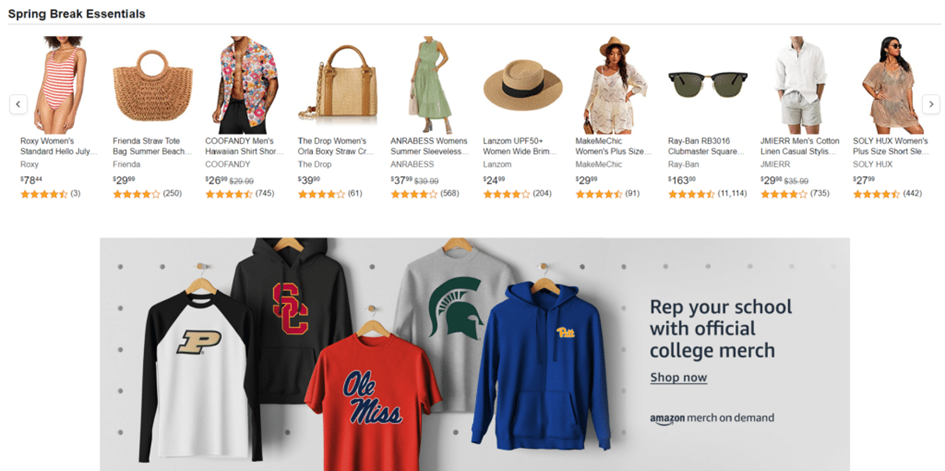
Amazon transformed from an online bookstore into the world’s largest product marketplace, now hosting millions of third-party sellers who offer everything from electronic gadgets to household items alongside Amazon’s own retail operations. The platform is built on a robust technology stack that supports scalability and high performance, and offers an advanced logistics network (Fulfillment by Amazon), sophisticated recommendation algorithms, and a Prime membership program that ensures customer loyalty through fast shipping and additional services.
eBay
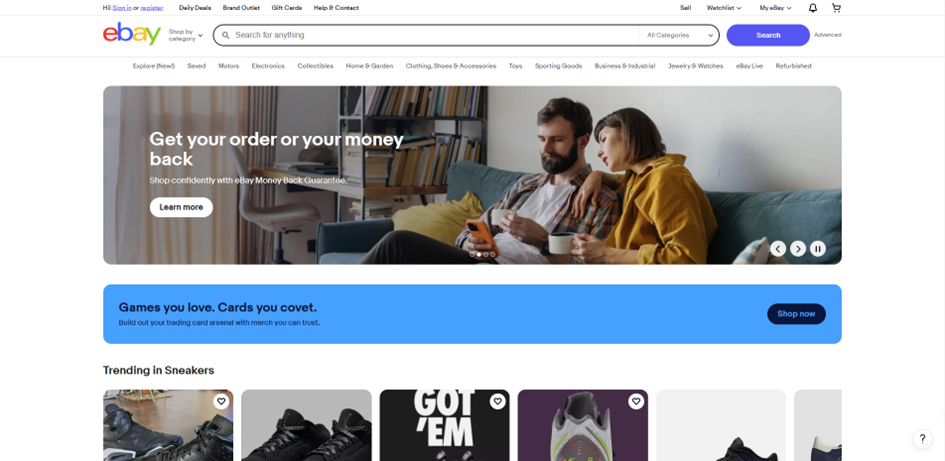
The platform pioneered the peer-to-peer online selling model, enabling both individual users and businesses to trade everything from vintage items to brand-new products. eBay distinguishes itself through its advanced feedback system, buyer protection program (eBay Money Back Guarantee), and Global Shipping Program that facilitates international commerce. A robust back end supports eBay's auction heritage and modern e-commerce features like Best Offer options, authenticated luxury item sales (eBay Authenticate), and a deals marketplace that competes with traditional retail.
Etsy
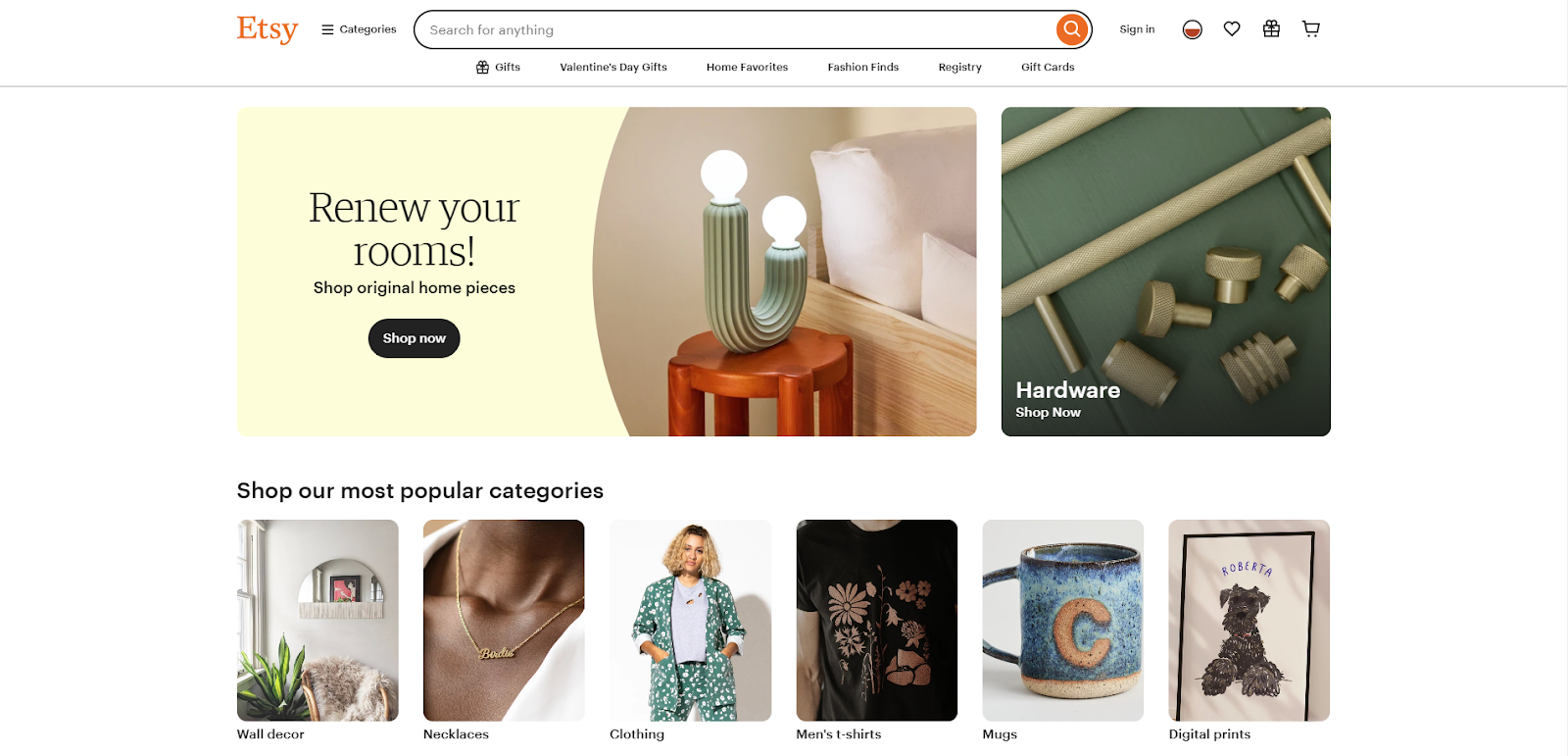
Etsy hosts millions of independent creators and small businesses that offer everything from handcrafted jewelry to custom furniture and digital art prints. The platform maintains its commitment to creative entrepreneurship through features like Pattern (for custom websites), sophisticated search tools highlighting unique items, and Etsy Studio for craft supplies. Developers can leverage Etsy's APIs and tools to customize or extend marketplace functionality, enabling advanced integrations and tailored solutions. The marketplace distinguishes itself through its focus on handmade, vintage, and customizable products while offering seller tools like Etsy Ads, the Star Seller program to recognize top performers, and Etsy Payments, which simplifies transactions across multiple currencies.
Service Marketplace
The next one is a service marketplace. It is an online platform that connects professional service providers with customers seeking specific services. Building robust service marketplaces relies heavily on software development, as custom software solutions and application architecture are essential for creating scalable, secure, and user-friendly platforms. Instead of browsing products, users can search for various services, such as home maintenance, holiday rentals, online freelancing jobs, and much more. The success of service marketplaces lies in their ability to standardize service delivery while maintaining quality through ratings, reviews, and verification systems. This way, the marketplace is organized, and potential customers can easily find what they are looking for.
Key characteristics:
- Booking and scheduling systems with real-time availability
- Detailed service provider profiles with credentials and reviews
- Standardized pricing models and secure payment processing
- Communication tools between providers and customers
- Quality control through verification and rating systems
Examples of service marketplaces:
Fiverr

Fiverr is a leading freelance marketplace where professionals offer their skills across diverse categories, including digital marketing, graphic design, programming, and writing. The platform stands out through its standardized “gig” system, where services are packaged into clear offerings with defined deliverables, timeframes, and prices while providing tools for secure payments, milestone tracking, and workflow management.
For complex or ongoing projects, clients can assemble a dedicated development team on Fiverr to handle technical aspects such as security implementation, API integration, and ongoing maintenance.
Upwork
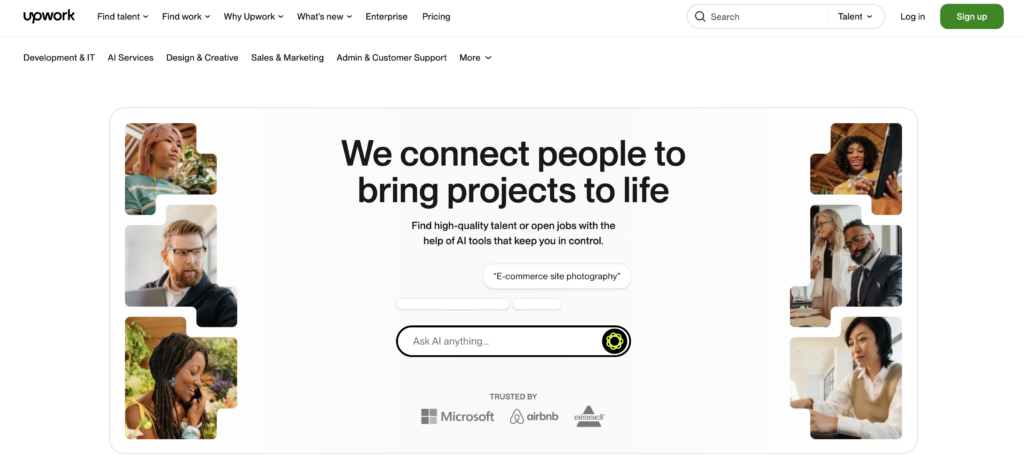
Similarly to Fiverr, Upwork is also one of the largest freelance marketplaces, now connecting millions of skilled professionals with businesses seeking talent across different fields. Upwork places a strong emphasis on understanding and meeting client needs, ensuring that both freelancers and clients can find the right match for their projects. However, Upwork tends to attract more professional freelancers and higher-value and longer-term projects, while Fiverr is often associated with quick, specific tasks and creative services.
TaskRabbit
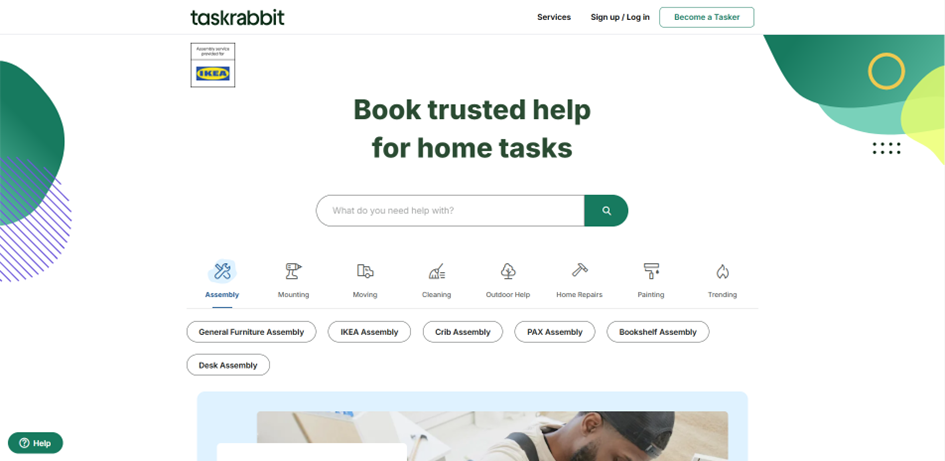
TaskRabbit connects people needing help with everyday tasks to skilled “Taskers” who can assist with everything from furniture assembly to home repairs and moving. What makes TaskRabbit stand out is its instant booking system, verified background checks, secure payment processing, and detailed tasker profiles with skills ratings, which make it easy and safe for users to find reliable help. The platform, acquired by IKEA in 2017, also maintains strong integration with IKEA’s furniture assembly services and has expanded into various home-related tasks.
Subscription Marketplace
The third type is a subscription marketplace which is a platform where vendors offer recurring products or services to customers through flexible subscription plans. The success of this model comes from providing predictable revenue streams for vendors while offering customers convenient access to regularly updated content or products. Over the past years, the subscription marketplace model has gained significant popularity as consumers increasingly prefer access over ownership and value the convenience of automated, regular deliveries or content updates.
Key characteristics:
- Automated recurring billing and subscription management
- Flexible subscription plans and pricing tiers
- Customer retention and engagement analytics
- Easy subscription modification and cancellation tools
- Content or product delivery scheduling systems
Examples of subscription marketplaces:
Netflix

Netflix operates as a leading subscription-based streaming marketplace, offering a vast library of movies, TV shows, and original content from multiple studios and production companies. The platform excels through its sophisticated recommendation algorithm, multiple subscription tiers with different video quality and screen options, and significant investment in original content production.
Spotify

Spotify functions as a comprehensive music and podcast streaming marketplace that connects listeners with millions of songs from artists and record labels, along with a growing library of podcast creators. The platform differentiates itself through features like personalized playlists, sophisticated music discovery algorithms, and a freemium model that offers both ad-supported and premium subscription tiers. These features are powered by advanced technologies that enable efficient streaming and highly accurate content recommendations.
MasterClass
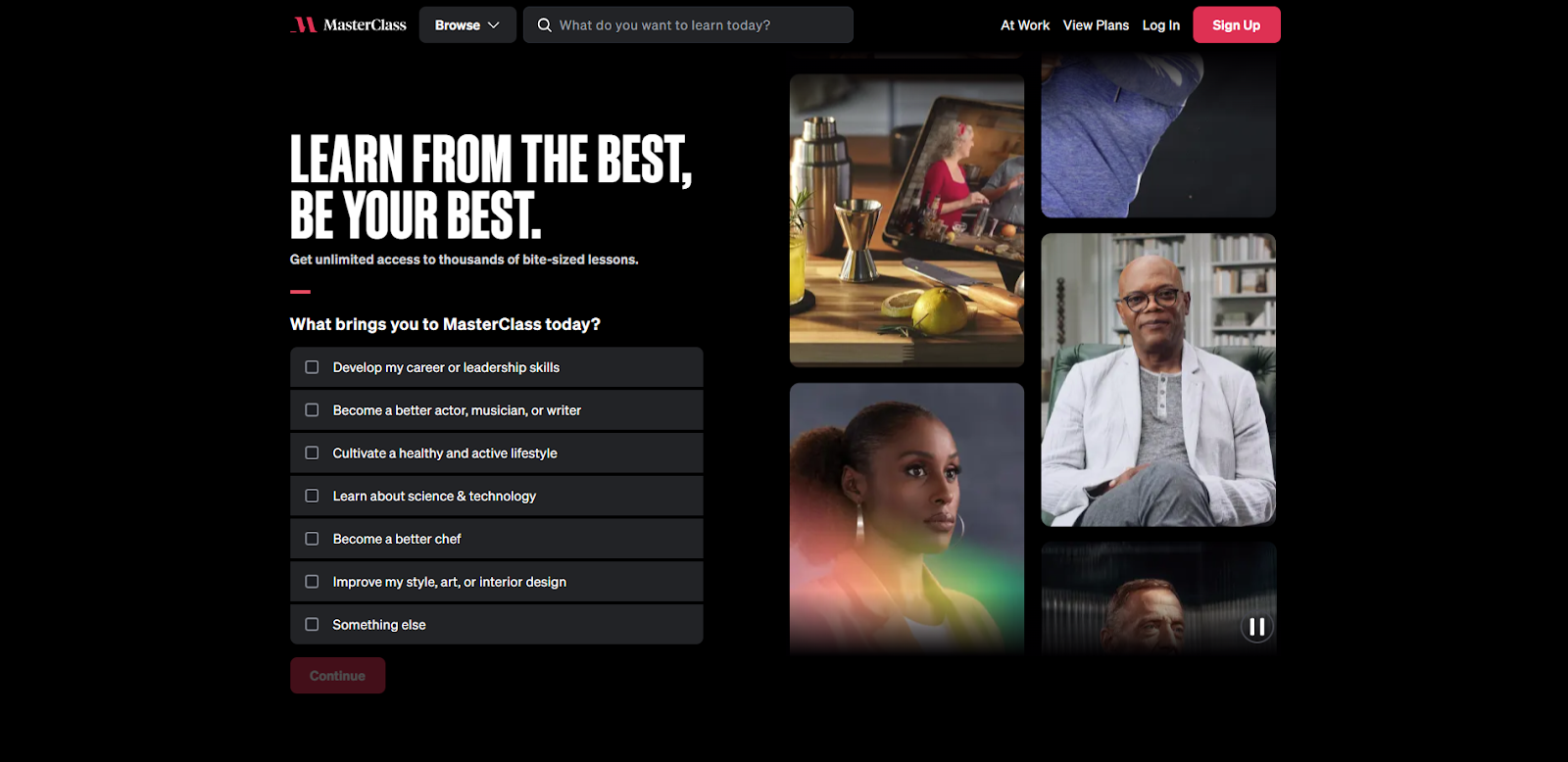
MasterClass evolved from a niche online education platform into a premium subscription-based marketplace for learning, connecting global audiences with world-class leaders, celebrities, and industry experts who share their knowledge through high-production-value video courses. The platform revolutionized online learning by featuring instructors like Gordon Ramsay for cooking, Hans Zimmer for film scoring, and Serena Williams for tennis, offering cinematic-quality content through an annual all-access subscription model.
Having explored various types of marketplaces - from product platforms like Amazon through service marketplaces like Fiverr to subscription-based platforms like Netflix - it's clear that each type requires specific features and capabilities to operate effectively. This is where Sylius comes in as a flexible foundation for building any of these marketplace types. Let's explore why this eCommerce framework is particularly well-suited for creating and managing marketplace platforms.
Why is Sylius a good solution for building marketplaces?
Sylius is an open-source eCommerce framework built on PHP Symfony, designed to provide maximum flexibility and customization options for online businesses. Sylius supports custom marketplace development, allowing businesses to create tailored solutions that fit unique business models and requirements. With its API-first modular monolith architecture, Sylius enables businesses to adapt and extend the platform to meet specific requirements while maintaining high code quality and minimal technical debt. Sylius is also compatible with various marketplace development platforms, making it a versatile choice for different technical ecosystems. Let’s browse the core advantages that make this solution stand out in front of other options.
Sylius Marketplace Suite
First and foremost, the Sylius Plus module, Marketplace Suite, provides handy tools for managing a multi-vendor platform, including vendor registration and verification, product management, commission handling, and communication systems. The module also features integrated management systems for vendors and products, streamlining inventory management, enhancing security measures, and supporting API integrations. The module streamlines marketplace operations by offering features like customizable vendor profiles, channel-specific product listings, flexible shipping configurations, and robust admin controls for overseeing the entire marketplace ecosystem.
What’s more, Marketplace Suite is built with scalability and performance as core priorities. Its architecture is specifically designed to handle high-traffic volumes and manage extensive product catalogs efficiently, ensuring smooth operation even as the marketplace grows.
https://bitbag.io/blog/sylius-marketplace-suite-comprehensive-guide
Integrations with payment providers
Secondly, Sylius offers straightforward integration with major payment solutions, including PayPal, Mollie, Stripe, and Adyen, providing marketplace owners with flexible options for handling multi-vendor transactions. These integrations support various payment methods and offer specialized marketplace payment solutions, ensuring secure and efficient financial operations for both vendors and customers.
Scalability
Thanks to its modular architecture and Symfony foundation, Sylius provides exceptional scalability that allows marketplaces to grow without compromising performance. The platform's API-first approach and ability to integrate with external systems like Product Information Management (PIM) or Enterprise Resource Planning (ERP) ensure the marketplace can expand and adapt to increasing business demands.
Valuable plugins for managing marketplaces
Sylius benefits from a rich ecosystem of plugins that enhance marketplace functionality, including tools for content management (CMS Plugin), advanced search (Elasticsearch Plugin), shipping management (ShippingExport Plugin), and customer engagement (Wishlist Plugin, Bonus Points Plugin). These plugins, many developed by the community, provide cost-effective solutions for adding new features and improving the marketplace experience.
Examples of Sylius-based marketplaces
Before jumping to the conclusion of today's article, let's look at the latest Sylius-based projects that leveraged the Sylius capabilities in real-world marketplace implementations.
JAST USA
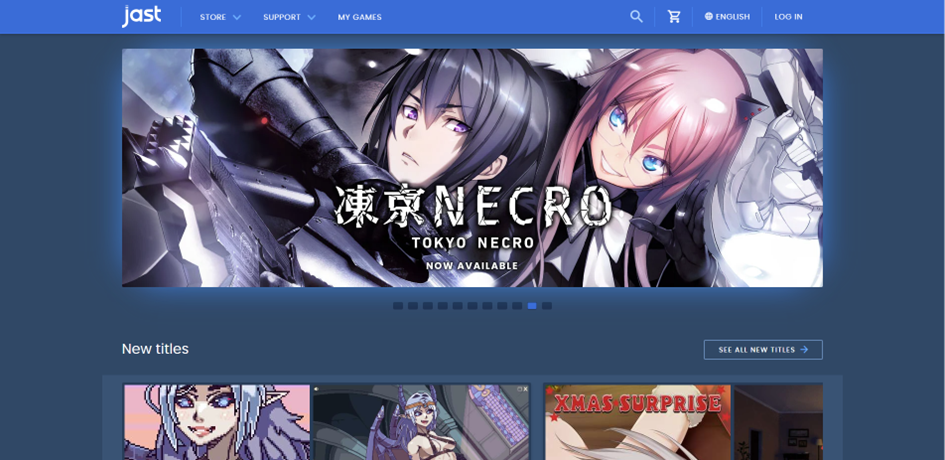
JAST USA, established in 1996, is a leading publisher and online retailer specializing in anime-inspired video games. To enhance user experience and overall performance, they had to migrate their online store from Magento to Sylius, addressing accumulated technical debt and modernizing their platform.
To modernize the marketplace and ensure the best possible performance, BitBag addressed numerous challenges. The main “marketplace-oriented” changes included a new payment gateway, customized returns system, advanced product search and filtering, loyalty points system, and regional pricing system.
The brand-new platform is a fully modern, high-performing marketplace that has significantly improved JAST USA's online presence. The migration from Magento to Sylius brought immediate benefits, including faster file downloads through AWS S3 integration, intuitive product discovery with Elasticsearch implementation, and improved customer engagement through features like the loyalty points system and automated promotions. The custom regional pricing system and new payment gateway, in turn, have expanded market reach and increased sales.
<div class="rtb-text-box is-blue-50">Learn more about this project from our case study >></div>
WaVa.Exchange
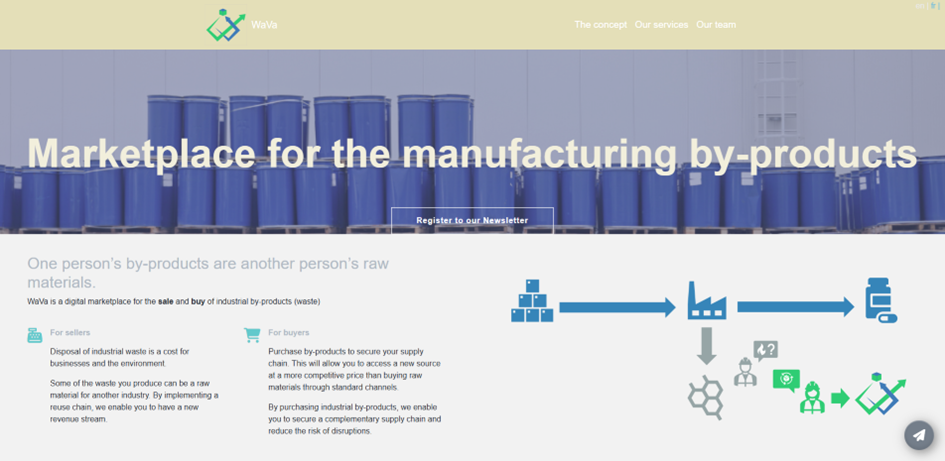
WaVa.Exchange is an innovative marketplace platform that revolutionizes the exchange of industrial by-products. It connects businesses looking to manage their production waste with companies that can use them as raw materials in their processes, actively supporting the development of a circular economy. The platform stands out with its advanced data confidentiality protection system while maintaining full transaction transparency. Sellers can monetize industrial waste while buyers gain access to economical and sustainable materials.
All of this contributes to building more efficient, sustainable, and environmentally friendly industrial practices, while generating measurable business benefits for all platform participants.
Centre of Excellence

Centre of Excellence is a leading online learning platform offering a diverse range of fully accredited courses across various disciplines, including holistic therapy, business, and personal development. With over 1,000 flexible courses available, learners can access materials 24/7 across any device, allowing them to study at their own pace without deadlines. The platform provides a state-of-the-art online learning experience, enabling students to pursue their educational goals from anywhere. All courses come with full support from dedicated tutors in the chosen subject field, ensuring learners receive guidance throughout their studies.
Centre of Excellence has been recognized with multiple international business awards, including Best Online Education and Training Provider, highlighting its commitment to delivering exceptional value to customers.
Summary
Building a successful marketplace platform requires careful consideration of several key factors. A solid understanding of the marketplace development process is crucial for making informed decisions at every stage. When choosing the technology for your marketplace, it’s essential to analyze your specific business needs, target audience, and long-term scalability requirements. During the planning phase, MVP development is highly recommended to validate your marketplace idea, gather user feedback, and iterate before scaling the platform.
Sylius emerges as a compelling choice for marketplace development due to several distinctive advantages. Its Marketplace Suite provides comprehensive tools for vendor management and platform operations, while the framework’s modular architecture ensures excellent scalability. The platform’s robust integration capabilities with payment providers, extensive plugin ecosystem, and proven track record in real-world implementations make it a reliable foundation for various marketplace types. To ensure success, make sure you address critical aspects such as consistent brand experience, customizable notifications, and effective API integration.
<div class="rtb-text-box is-blue-100">If you're considering building a marketplace platform or would like to explore how Sylius can benefit your business, our team at BitBag is ready to help. With extensive experience in implementing Sylius-based marketplaces, we can guide you through the process from initial concept to successful launch.</div>
{{cta-service-mvm="/comp/cta"}}

